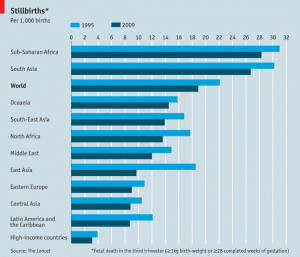
The state of maternal health in Nigeria is nothing to be happy about. Mothers die regularly either before or after the birthing process. Regrettably, Pregnancy in Nigeria is now a disease. Recently, the Lancet reported that “maternal mortality in Nigeria is 608 per 100 000 live births and only 3% of HIV-positive mothers receive antiretroviral treatments”. Most people are aware of all the issues the country must resolve. They are great and numerous, that is obvious. However, the health of mothers and children is so far down the line of priorities for our government that it has become highly negligent. The health of mothers has been shown as an indicator on a government’s commitment to developing its human capital and it seems Nigeria is lacking in this front. The little gains in economic growth cannot be sustained without these pressing improvements in human capital.
This article reviews the issue of stillbirth in Nigeria. The idea that a lot of unborn children are dying needlessly is slowly gaining traction in international health circles. The death of an unborn fetus is termed a stillbirth after 20 weeks of pregnancy. For a woman to go through 9 months of pregnancy and the agony of labor and proceed to give birth to a dead child is terrifying. Even worse is the fact that these senseless deaths can be avoided with simple interventions.
Here are the facts
Nigeria has the highest burden of stillbirths, along with 9 other countries in the world. They share among them 66% of the world burden. There are 42 stillbirths in every 1,000 births in Nigeria. That is: of every 1,000 women giving birth, 42 of them give birth to dead babies. 42 dead babies! This is astounding. It was reported in The Lancet Stillbirths Series that “an African woman has a 24 times higher chance of having a stillbirth at the time of delivery than a woman in a high-income country”. Nothing justifies this but lack of planning, incompetence, and corruption of those meant to be stewards of these new lives.
The major interventions that have the greatest chance of reducing this high rate of stillbirths in Nigeria are ramping up access to antenatal care especially in the first and second trimesters, testing pregnant women for syphilis during antenatal care, and also to increase access to emergency obstetric care in all areas of the country. Interventions such as “folic acid supplementation, prevention of malaria, and improved detection and management of syphilis during pregnancy” can reduce the burden of stillbirths in resource-constrained areas in countries like Nigeria. These three checks can be incorporated into antenatal care. There are many other inventions but these will maximize gains with very little resources.
Nigeria currently spends only 6% of government revenue on the health system. This is far below the average even in among developing countries. Most Nigerians have to buy health care out of their pocket, which has major adverse effects on health outcomes and health seeking behavior. The recently passed National Health Bill advocates for a coherent and centralized health policy to be developed by the Federal Ministry of Health. It is absolutely important that interventions to prevent stillbirths be incorporated into the updated maternal and child health policy. Testing and treatment for syphilis, advocating folic acid supplements and preventing malaria in pregnant women should be mandatory components of all antenatal care plans. The Ministry of Health should serve as the regulator and should penalize any caregiver that fails to provide these absolutely important interventions.
Increasing access to antenatal care is also of great importance. Studies show that “Nigerian women tended to obtain care late in pregnancy, and for about one third the care was inadequate”. Something must be done to increase access and to improve antennal and obstetric care.
It is not costly to prevent this horror. It is a low hanging fruit that will improve Nigeria’s atrocious maternal mortality and child mortality rates. If this is not done, I suggest that Nigerian women should consider a strike on pregnancy. One should think carefully before deciding to voluntarily contact a condition that might take ones life.